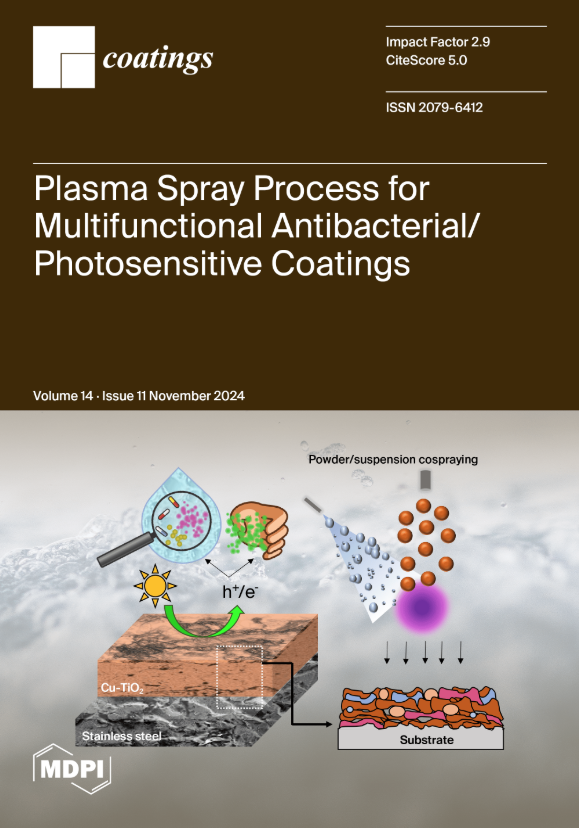Thermal Corrosion Properties of Composite Ceramic Coating Prepared by Multi-Arc Ion Plating
IF 2.8
3区 材料科学
Q2 MATERIALS SCIENCE, COATINGS & FILMS
引用次数: 0
Abstract
In this study, a NiCr/YSZ coating was applied to a γ-TiAl surface using multi-arc ion plating technology to enhance its high-temperature performance and explore the mechanisms of high-temperature oxidation and thermal corrosion. The thermal corrosion properties of the γ-TiAl matrix and NiCr/YSZ coating were investigated at 850 °C and 950 °C using a constant-temperature corrosion test in a 75% Na2SO4 + 25% NaCl mixture. The results indicate that after 100 h, the thermal corrosion weight gain of the coating samples was 70.1 mg/cm2 at 850 °C and 118.2 mg/cm2 at 950 °C. At these temperatures, sulfide formation on the surface increases, leading to a loose and porous surface. After 100 h of high-temperature corrosion at 850 °C, the primary oxidation product on the surface of the coating was tetragonal-ZrO2. At 950 °C, Y2O3, which mainly acts as a stabilizer in YSZ, reacted with Na2SO4, resulting in the continuous consumption of Y2O3. This reaction caused a substantial amount of tetragonal-ZrO2 to transform into monoclinic-ZrO2, altering the volume of the ceramic layer, which induced internal stress, crack propagation, and minor spallation. A continuous and dense internal thermally grown oxide (TGO) layer effectively impeded the diffusion of molten salt substances and oxygen, thereby significantly improving the thermal corrosion resistance of the thermal barrier coating.多弧离子镀制备的复合陶瓷涂层的热腐蚀特性
本研究采用多弧离子镀技术在γ-TiAl 表面镀上了一层 NiCr/YSZ 涂层,以提高其高温性能,并探索高温氧化和热腐蚀的机理。在 75%Na2SO4 + 25%NaCl 混合物中进行恒温腐蚀试验,研究了γ-TiAl 基体和 NiCr/YSZ 涂层在 850 ℃ 和 950 ℃ 下的热腐蚀特性。结果表明,100 小时后,涂层样品的热腐蚀增重在 850 °C 时为 70.1 mg/cm2,在 950 °C 时为 118.2 mg/cm2。在这些温度下,表面硫化物形成增加,导致表面疏松多孔。在 850 °C 高温腐蚀 100 小时后,涂层表面的主要氧化产物是四方氧化锆。950 °C 时,YSZ 中主要起稳定剂作用的 Y2O3 与 Na2SO4 发生反应,导致 Y2O3 不断消耗。这一反应导致大量四方 ZrO2 转变为单斜 ZrO2,改变了陶瓷层的体积,从而引起内应力、裂纹扩展和轻微剥落。内部连续致密的热生长氧化物(TGO)层有效地阻止了熔盐物质和氧气的扩散,从而显著提高了隔热涂层的耐热腐蚀性能。
本文章由计算机程序翻译,如有差异,请以英文原文为准。
求助全文
约1分钟内获得全文
求助全文
来源期刊

Coatings
Materials Science-Surfaces, Coatings and Films
CiteScore
5.00
自引率
11.80%
发文量
1657
审稿时长
1.4 months
期刊介绍:
Coatings is an international, peer-reviewed open access journal of coatings and surface engineering. It publishes reviews, research articles, communications and technical notes. Our aim is to encourage scientists to publish their experimental and theoretical results in as much detail as possible. There is no restriction on the length of the papers. Full experimental and/or methodical details must be provided. There are, in addition, unique features of this journal:
* manuscripts regarding research proposals and research ideas will be particularly welcomed
* electronic files or software regarding the full details of the calculation and experimental procedure - if unable to be published in a normal way - can be deposited as supplementary material
 求助内容:
求助内容: 应助结果提醒方式:
应助结果提醒方式:


